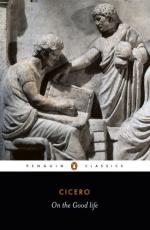
|
| Name: _________________________ | Period: ___________________ |
This quiz consists of 5 multiple choice and 5 short answer questions through Chapter 2: On Duties.
Multiple Choice Questions
1. What or whom does Michael Grant, the author of the introduction, introduce?
(a) Roman philosophy.
(b) Marcus Tullius Cicero.
(c) Greek philosophy.
(d) Himself.
2. What did Cicero believe applied to every human, according to Grant?
(a) The natural law.
(b) The ration to love others.
(c) Ability to forgive.
(d) The golden rule.
3. What does Cicero emphasize in the third and fourth principles in "On Duties"?
(a) Taxes are inevitable.
(b) Love does not always prevail.
(c) Expediency and rightness are connected.
(d) Dictators need a balance in their ruling.
4. According to the introduction, what protestant thinkers was Cicero popular among?
(a) Melancthon.
(b) Luther.
(c) Pope Gregory.
(d) Luther and Melancthon.
5. According to the introduction, how did Pope Gregory I respond to Cicero's work?
(a) He refused to ackowledge his writings.
(b) He gave him high praise.
(c) He burned them.
(d) He banned his work for centuries.
Short Answer Questions
1. Why is statesmanship destroyed, according to "On Duties"?
2. How does the argument in "Discussions at Tusculum" begin?
3. What are external 'bads' considered to be, according to Cicero?
4. What is concluded about the achievement of moral goodness, in "Discussions at Tusculum"?
5. Where is the setting of "Discussions at Tusculum"?
|
This section contains 258 words (approx. 1 page at 300 words per page) |

|




